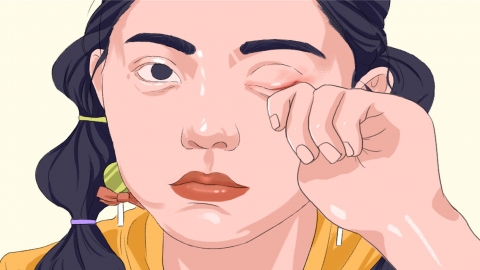What causes horizontal nystagmus?
Horizontal nystagmus may be caused by excessive fatigue, mental stress, Ménière's disease, vestibular neuritis, cerebral infarction, and other conditions, and can be managed according to the specific circumstances. If discomfort occurs, it is recommended to seek timely medical consultation to clarify the condition and follow medical advice for treatment, avoiding delays in care.

1. Excessive fatigue: Prolonged eye use, lack of sleep, or physical exhaustion can cause eye muscle fatigue, leading to nystagmus. Management includes ensuring adequate rest and sleep, avoiding prolonged eye strain, and performing appropriate eye massage and warm compresses to relieve eye fatigue.
2. Mental stress: Excessive emotional tension or anxiety may affect the nervous system and potentially cause horizontal nystagmus. Deep breathing, meditation, and progressive muscle relaxation techniques can help alleviate mental stress and maintain emotional stability.
3. Ménière's disease: The cause is an excess of endolymph in the inner ear, leading to endolymphatic hydrops. Symptoms include recurrent episodes of rotational vertigo, fluctuating hearing loss, tinnitus, and a sensation of ear fullness, often accompanied by horizontal nystagmus. Patients may take medications such as betahistine mesylate tablets, flunarizine hydrochloride capsules, and diazepam tablets under a physician's guidance to alleviate symptoms.
4. Vestibular neuritis: This condition is often caused by viral infection and presents with sudden vertigo, nausea, and vomiting, accompanied by horizontal nystagmus without hearing loss. It is recommended to follow medical advice to use medications such as prednisolone tablets, acyclovir tablets, and mecobalamin tablets to relieve symptoms.
5. Cerebral infarction: Blockage of blood vessels in the brainstem leads to ischemic damage in localized brain tissue, potentially causing horizontal nystagmus, along with limb numbness or weakness, slurred speech, and difficulty swallowing. Patients should follow medical instructions to use medications such as aspirin enteric-coated tablets, clopidogrel bisulfate tablets, and edaravone injections to alleviate symptoms.
In daily life, it is important to develop good habits, avoid excessive fatigue, and refrain from vigorous exercise to prevent physical discomfort. It is recommended to engage in appropriate activities such as walking and jogging based on individual conditions, which can help enhance physical resistance and promote recovery.
References:
[1] Wang Qi, Yin Gentie, Zhang Shuqi, et al. Retrospective analysis of clinical features of 63 patients with vestibular neuritis [J]. Journal of Clinical Otorhinolaryngology Head and Neck Surgery, 2025, 39(01): 19-23.
[2] Wang Boshen, Leng Hui, Sun Haibo. Co-expressed gene characteristics of Ménière's disease and vestibular migraine and molecular docking prediction of gastrodin [J]. Journal of Otolaryngology and Ophthalmology of Shandong University, 2025, 39(01): 29-40.




